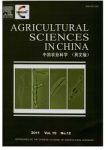Effects of Ca^(2+)/CaM Messenger System Inhibitors on Ethylene-Induced Increase in Lycopene Content
Effects of Ca^(2+)/CaM Messenger System Inhibitors on Ethylene-Induced Increase in Lycopene Content作者机构:DepartmentofFoodScienceGuizhouUniversityGuiyang550025P.R.China CollegeofBio-SystemsEngineeringandFoodScienceZhejiangUniversityHangzhou310029P.R.China InstituteofAgro-PhysicPlantPhysiologyandBiochemistryHebeiAcademyofAgricultureandForestrySciencesShijiazhuang050051P.R.China
出 版 物:《Agricultural Sciences in China》 (中国农业科学(英文版))
年 卷 期:2003年第2卷第12期
页 面:1387-1392页
学科分类:09[农学] 0902[农学-园艺学] 090202[农学-蔬菜学]
基 金:The study was supported by National Natural Science Foundation of China(30360069) Ph D Foundation of Hebei Academy of Agriclulture and Forestry Sciences,China
主 题:Tomato fruit Ethylene Lycopene Ca 2+-CaM messenger system
摘 要:The changes of lycopene content during ripening and senescence of tomato fruit and the relationship between ethylene glycol-bis (EGTA, Ca 2+ chelator), verapamil (Vp, Ca 2+ channel blockers), trifluoperazine (TFP), chloropromaize (CPZ) (CaM antagonism) and ethylene-induced increase in lycopene content in tomato fruit were investigated. Lycopene content accumulated obviously during ripening and senescence of tomato fruit after harvest at pink stage. Low temperature inhibited but ethylene enhanced the lycopene content. Meanwhile, ethylene also promoted calmodulin (CaM) content in tomato fruit, which was related to the concentration of ethylene. When EGTA, Vp, TFP and CPZ with ethylene were used to treat tomato fruit, ethylene-induced increase in lycopene content could be reversed, indicating that blocking Ca 2+ channel in plasma membrane or chelating extracellular Ca 2+ or inhibiting the activity of CaM could decrease the action of ethylene, and suggesting that Ca 2+-CaM messenger system may be involved in lycopene increase induced by ethylene.



